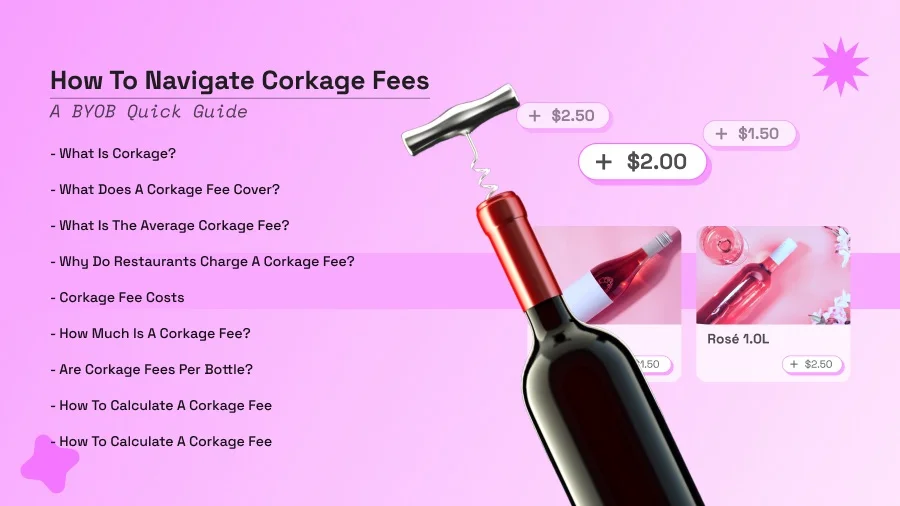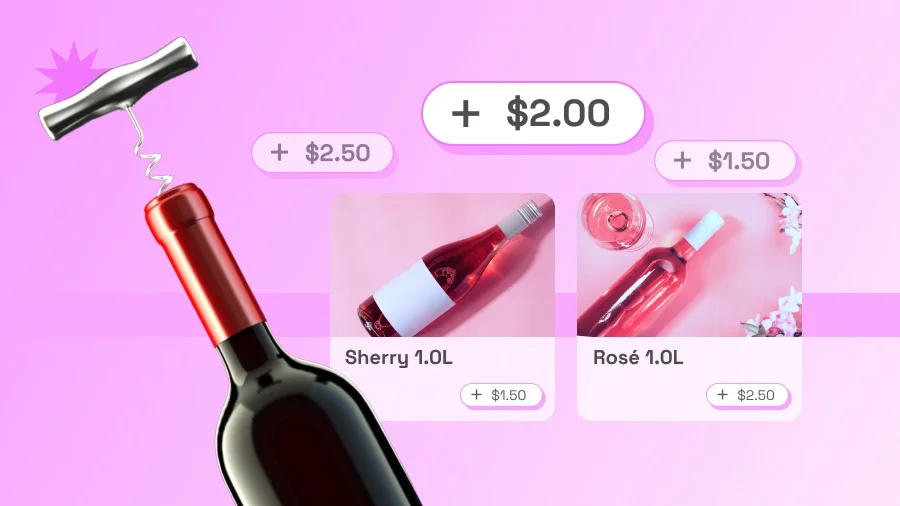How to Navigate Corkage Fees: A BYOB Quick Guide
Having a glass of wine with dinner is the perfect way to end the night.
Why not enjoy your favorite bottle of wine while enjoying the ambiance, company, and food of a great restaurant?
With their meal, some restaurants allow customers to bring their own bottles of wine (or beer or liquor). Often, restaurants that allow BYOB (“bring your own bottle") charge diners a corkage fee to cover the cost of serving the wine and to recoup lost revenue. A corkage fee may be appropriate if your restaurant offers bring-your-own-beer (BYOB) or bring-your-own-wine (BYOW) service. How does that work? What would you charge for it, and what would you charge?
This quick guide will provide you with a quick overview of corkage fees.
A corkage fee is a cost imposed on a customer for consuming their own beverages on a venue's premises. Corkage costs are typically connected with wine because wine is the beverage that is usually drunk with a meal. Long drinks (such as beers and ciders), spirits, and even soft drinks can be subject to corkage fees.
What Does a Corkage Fee Cover?
Part of the reason restaurants charge a corkage fee is to offset the expense and time associated with serving a bottle of wine.
While removing the cork from the bottle is the most basic that restaurants provide service, you also provides customer with stemware (anything from a simple wine glass to a glass designed for that specific sort of wine), refill glasses, and (possibly) chill the wine. The complexity of services provided to BYOB customers depends on the sophistication of the restaurant and the corkage fee.
What Is the Average Corkage Fee?
Many restaurants charge between $10 and $40 for each bottle of wine as corkage. Corkage fees in New York City, for example, average $36 a bottle. Some corkage fees, however, can exceed $100.
Generally, the higher the price of a restaurant, the higher the corkage fee. Because high-end restaurants provide exceptional service and wine-related amenities, they can charge higher corkage costs than your favorite neighborhood takeout spot.
If you’re imposing a corkage fee for the first time and don’t know where to start, make it equivalent to the cheapest bottle of wine available on your menu. There are two ways to charge: per bottle or person (also known as “per stem).

Why Do Restaurants Charge a Corkage Fee?
A corkage fee covers the labor and costs tied to wine storage. The fee may cover some or all of the following bar or restaurant services and efforts:
- Revenue was lost due to not purchasing the restaurant's wine
- Use of restaurant or lounge space
- The restaurant's investment in their own wine service program includes actions linked to designing a wine list, keeping a sommelier on staff, and training staff on wine selection.
- Wine-related accommodations (wine buckets, cooking wine, or disposing of bottles)
Corkage Fee Costs
Wine bottles in a wine cooler with a tree and a sunray in the backdrop We've compiled a list of average corkage fees and the logic behind them.
How Much Is a Corkage Fee?
Corkage fees usually range from $10 to $40 per bottle but can reach $100 or more. The price varies based on the restaurant and may occasionally change depending on the type of wine brought in. Some restaurants charge a corkage fee equal to the cost of their least expensive wine.
Are Corkage Fees Per Bottle?
Most restaurants charge a corkage fee for each bottle. Corkage costs may also be charged per table or person (as well as per glass or “stem").
How to Calculate a Corkage Fee
Corkage fees at restaurants are usually proportionate to the level of service provided by the restaurant. As a result, a hefty cost is most typically associated with a high-end restaurant with fine glassware, a wine list, and sommeliers. A lesser cost, on the other hand, is associated with fewer alcohol-related amenities and services. Guests may open their own bottles of wine, fill their own glasses, and use less sophisticated glassware.
The Pros and Cons of Offering BYOB
Perhaps your restaurant is the kind of place where BYOB might be a fantastic fit, but you're still deciding whether to offer it. We've weighed the pros and cons of allowing BYOB to help you make an informed decision more quickly.
Pros of Having BYOB at Your Restaurant
1) Allows customers to drink even if the restaurant does not serve wine : If you still need to serve alcohol in your restaurant, BYOB lets consumers enjoy a product that they wouldn't be able to get otherwise from your restaurant.
2) Enhances memorable experiences : BYOB allows customers to turn a dinner into a special experience by bringing a wine that means something to them.
3) Makes your restaurant more competitive: If other restaurants in the area allow BYOB but yours does not, your business may be less enticing to diners. Keeping up with the competition is easier when you allow BYOB.
Cons of Offering BYOB at Your Restaurant
1) Profits lost : If customers are allowed to bring their own wine, they will not purchase wine from your wine list. It's not a problem if you don't serve wine. If you do, it might substantially reduce income because restaurants often have high profit margins on alcohol. However, you can recoup lost profits through your corkage fee.
2) Intoxicated guests: Guests who bring their own bottle can have more alcohol than if they paid the restaurant markup. As a result, BYOB might be a problem, especially in suburban or rural settings where customers drive to and from your restaurant. Prevent intoxication by training your servers to watch for signs of intoxication and consider setting up limits, such as two bottles per table maximum or a minimum of two people per bottle.
3) Slower turnover : Obviously, drinking a bottle of wine takes longer than a glass or two. Because guests who bring a bottle usually stay after dinner to finish the wine, this could slow down table turnover.
Do All Restaurants Charge a Corkage Fee?
Not all restaurants charge corkage. Restaurants that allow you to bring in your own alcohol, even if they serve their own wine, normally charge corkage costs if you bring in your own bottle of wine. Bring-your-own-wine (BYOW) or bring-your-own-bottle (BYOB) restaurants, on the other hand, usually offer a low or nonexistent corkage fee.
If you want to bring your own bottle to a restaurant, be sure you understand their policies.
Do Byo Restaurants Charge Corkage Fees?
Because they do not offer alcohol, many BYO restaurants do not have corkage fees. Because they do not feature cocktail, wine, or beer lists, costs and amenities associated with alcohol-serving restaurants (fancy wine glassware, sommeliers, and wine lists) are less likely to be present. As a result, BYOs do not need to make up for lost profits. Furthermore, BYO restaurants usually do not have a liquor license, and any expense related to alcohol may be considered an illegal charge by the restaurant for the alcohol. However, some BYO restaurants charge a corkage fee.
Find out more about What Are Rail Drinks and the anatomy in our latest blog.
Considerations When Offering BYOB
If you decide to allow BYOB at your restaurant, you'll need to do some further research to ensure that you're doing it legally and that it makes financial sense for your business.
Here are some things to think about as you implement BYOB in your restaurant.
(I) Laws
When it comes to implementing a BYOB policy at your restaurant, the first thing you should consider is how to do it legally. Do your research to see whether you can allow customers to bring in and consume a bottle of wine at your restaurant, whether you can charge for this, and whether your restaurant requires a liquor license or a BYOB permit to allow this.
Here are some examples of BYOB and corkage fee legislation in major cities across the United States and Canada:
- New York City: New York City restaurants must have a liquor license to allow customers to bring in their own bottles of alcohol. Restaurants can choose to charge corkage fees; they're not mandated by law.
- Philadelphia: Philadelphia is a haven for BYOB fans, and it doesn't end with wine. Diners sometimes bring their own hard liquor, purchase mixers from restaurants, and prepare their own well drinks. To enable BYOB, establishments in Philadelphia do not need a liquor license. Because neither the state of Pennsylvania nor the city of Philadelphia regulates corkage fees, some restaurants charge them while others do not.
- Boston: BYOB is illegal in most Boston neighborhoods. Restaurants are not authorized to charge corkage fees in places where BYOB is permitted.
- Toronto: In Ontario, restaurants with liquor licenses are permitted to allow patrons to bring in their own bottles of wine. While laws allow restaurants to charge corkage fees, they do not regulate how much they should be.
- Los Angeles: BYOB is only permitted in restaurants with a liquor license in California. There are no restrictions on the amount of corkage fees that licensed restaurants can charge.
Find out how your area governs liquor licenses, BYOB permits, and corkage costs by consulting a lawyer or fellow restaurateurs.
(II) Cost
How much should you charge BYOB diners if you decide to impose a corkage fee?
Ask yourself the following two questions:
1) What are your competitors charging?
This will give you a decent indication of the fees that diners are accustomed to paying. If you charge a much higher corkage cost than the restaurant down the block, guests will most likely take their bottle and their business elsewhere. To stay competitive, that is.
2) What kind of service will you provide to customers who bring their own wine?
Will you only give a corkscrew and plastic cup, or will you also provide a pouring service and an ice bucket? If you already have a sommelier and an exceptional wine list, you can charge up to $100 for corkage.
Unbottling BYOBs and Corkage Fees
Wine and a delectable meal are a classic combination. When you allow customers to bring their own bottles and charge a corkage fee, you allow them to enjoy a special wine while recouping resources spent on service or losing a sale. Check your local laws before offering BYOB at your restaurant to ensure you won't get into trouble. Cheers!
KEY TAKEAWAYS

